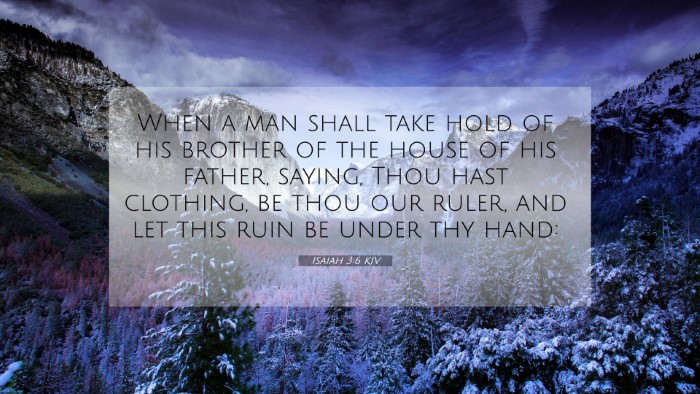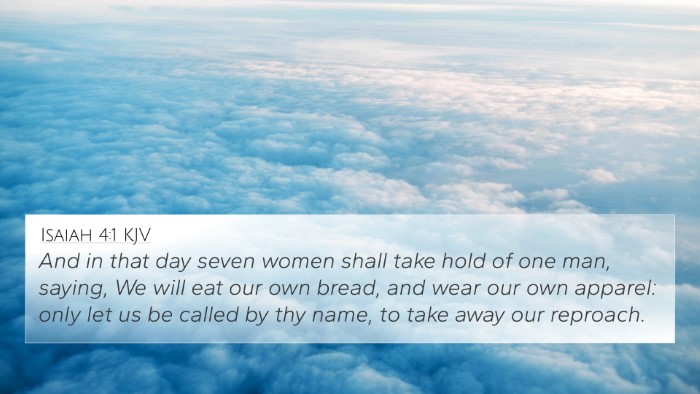Understanding Isaiah 3:6
Isaiah 3:6 states:
"When a man shall take hold of his brother of the house of his father, saying, 'Thou hast clothing, be thou our ruler, and let this ruin be under thy hand.'" (KJV)
This verse serves as a poignant reflection of the societal chaos and moral decline in Judah during King Isaiah's time. It encapsulates the sense of desperation and the search for leadership amidst the tumult. Let’s delve into the meanings and insights provided by public domain commentaries from Matthew Henry, Albert Barnes, and Adam Clarke.
Commentary Insights
Matthew Henry's Commentary
Matthew Henry interprets this verse as indicative of the breakdown of societal order. In times of crisis, individuals seek leadership not for noble reasons, but out of sheer necessity and the dire conditions they face. The act of a man seeking a brother to lead signifies the familial ties that are strained in troubled times.
He notes that those in positions of power may not possess the qualities necessary to lead justly. Henry emphasizes that the desire for leadership is flawed when individuals are driven by despair rather than divine guidance or wisdom.
Albert Barnes' Notes
Albert Barnes focuses on the symbolism of the clothing mentioned in the verse, suggesting that it represents superficial qualifications for leadership. He argues that the appeal to one’s material possessions (like clothing) as a basis for ruling is misplaced and highlights the moral inadequacy of leadership at that time.
Barnes indicates that this verse reflects the pervasive state of disarray in Judah, where people are looking for someone—anyone—to impose order, leading to a cycle of poor leadership choices.
Adam Clarke's Commentary
Adam Clarke provides historical context, explaining that this verse mirrors the social upheaval and loss of traditional structures in society. He interprets the request for leadership, emphasizing that individuals were reduced to seeking governance based on the most trivial of qualifications, like having clothing.
Clarke articulates that this signifies a grave vacuum of honest and capable leaders, which results in further decline and chaos for an already disheartened populace.
Key Themes and Messages
- Desperation for Leadership: This verse conveys a sense of urgency where traditional leadership is absent.
- Flawed Qualifications: Reliance on superficial traits such as material possessions highlights the ethical degradation.
- Family and Brotherhood: The notion of looking to family for leadership reveals strained bonds within society.
- Moral Decline: The verse is a critique of the moral and social conditions prevalent in Judah.
Bible Verse Cross-References
Understanding Isaiah 3:6 is enriched when considering its connections with other Biblical texts. Here are some relevant cross-references:
- Jeremiah 5:31: "The prophets prophesy falsely, and the priests bear rule by their means; and my people love to have it so..."
- Micah 3:1-3: "And I said, Hear, I pray you, O heads of Jacob, and ye princes of the house of Israel; Is it not for you to know judgment?"
- Isaiah 1:23: "Thy princes are rebellious, and companions of thieves: everyone loveth gifts, and followeth after rewards..."
- Proverbs 29:2: "When the righteous are in authority, the people rejoice: but when the wicked beareth rule, the people mourn."
- Psalm 12:8: "The wicked walk on every side, when the vilest men are exalted."
- Isaiah 5:20: "Woe unto them that call evil good, and good evil; that put darkness for light, and light for darkness..."
- Isaiah 30:1: "Woe to the rebellious children, saith the LORD, that take counsel, but not of me..."
- 1 Samuel 8:5: "And said unto him, Behold, thou art old, and thy sons walk not in thy ways: now make us a king to judge us like all the nations."
- Ezekiel 22:30: "And I sought for a man among them, that should make up the hedge, and stand in the gap before me for the land..."
- Isaiah 9:16: "For the leaders of this people cause them to err; and they that are led of them are destroyed."
Thematic Connections
The connections between Isaiah 3:6 and other scriptures highlight the recurring themes of leadership, accountability, and moral integrity across the Bible. Through comparative Bible verse analysis, we can discern patterns of behavior and prophetic warnings that echo throughout the Old and New Testaments.
These themes are critical for understanding the nature of divine guidance and human failure. The linking of these scriptures allows for a richer interpretation of the vital importance of righteous leadership in harmonizing community life and faith.
Conclusion
Isaiah 3:6 serves as an essential reminder of the societal dynamics that can lead to moral and spiritual decay when appropriate leadership is looted or absent. By utilizing tools for Bible cross-referencing, believers can engage deeper in study, drawing invaluable insights about the constants of human nature and divine expectations.
Understanding such scriptures in their interconnected contexts not only enriches one’s spiritual journey but also equips individuals with the wisdom needed to navigate contemporary societal challenges.





